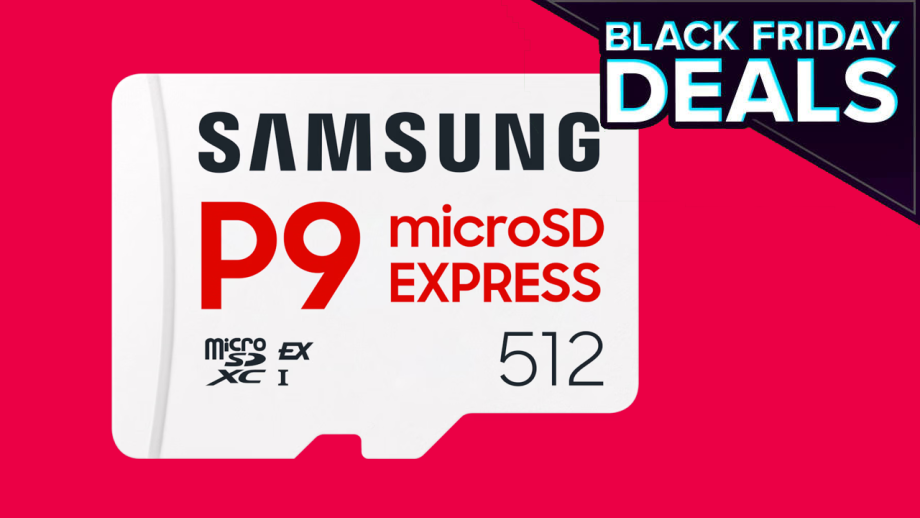Samsung’s new microSD Express Cards are discounted in Amazon’s Black Friday 2025 sale. Nintendo Switch 2 users can grab the Samsung 512GB P9 microSD Express Card for only $75 (was $100), which is the lowest price for a 512GB model we’ve seen on Amazon all year. The 256GB P9 is on sale for $47.49 (was $55).
Samsung launched the P9 microSD Express earlier this month, so we’re surprised to see the 512GB model with such a substantial discount. If you’re interested in expanding your Switch 2 storage capacity, you probably shouldn’t wait too long. It’s one of only a few Black Friday deals on microSD Express Cards (so far, at least).
Quick look: microSD Express Black Friday Deals
The popular Lexar Play Pro microSD Express is also featured in Amazon’s Black Friday sale, but unfortunately the 1TB edition is still priced at $200. The price cuts are for the 512GB and 256GB capacities. The 512GB is available for $99.49 (was $120), while the 256GB is down to $49.49 (was $60).

Best microSD Express Cards at Amazon
Below, we’ve listed every microSD Express Card from a reputable brand we could find on Amazon–though we excluded cards that are a lot pricier than average. The Switch 2 is the first major consumer device to use the ultra-fast storage format, so the market is understandably limited. That said, the number of options has doubled multiple times over since Nintendo announced the Switch 2 requires microSD Express to expand storage.
Best microSD Express Cards at Walmart
Walmart has a smaller selection, but it has three exclusive microSD Express Cards that you should know about, too. The retailer’s in-house tech brand usually has the most affordable 256GB and 512GB cards. The Onn 512GB microSD Express is currently going for $84.77, while the 256GB model is only $46.77. With the Samsung P9 512GB deal running at Amazon, Onn has been dethroned for the first time. Walmart recently restocked its exclusive SanDisk GamePlay 512GB microSD Express for $98.
Nintendo Switch 2 storage space can disappear fast
The Nintendo Switch 2 has 256GB of onboard storage. On the surface, this is a big leap forward, since it’s four times larger than the Switch OLED (64GB) and eight times larger than the original Switch and Switch Lite (32GB). But the Switch 2’s ability to run more graphically intensive games also means larger file sizes. For context, here are file sizes for some current and upcoming Switch 2 games published by Nintendo: Hyrule Warriors: Age of Imprisonment (43.4GB), Metroid Prime 4: Beyond (31.6GB), Kirby Air Riders (21.7GB), Zelda: Tears of the Kingdom (20GB), Mario Kart World (21.9GB), Pokemon Legends: Z-A (10GB), Donkey Kong Bananza (8.9GB).
You can save your storage space for those first-party games by grabbing physical editions, because all of the titles listed above have the full data file on the card. That’s been the case for every Nintendo-published game on Switch 2 so far, but Pokemon Pokopia will be a Game-Key Card. We’ll just have to wait and see if that’s an anomaly. For third-party titles, outside of rare exceptions like Cyberpunk 2077: Ultimate Edition and Rune Factory: Guardians of Azuma, physical games for Switch 2 are using Game-Key Cards. These are low-capacity cards that essentially serve as unlock keys to download the game from the eShop. So if you buy the physical edition of Madden NFL 26, you’ll still need to download the the game’s 57.1GB file from the eShop. Other sports games are even larger: NBA 2K26 is 69.7GB and EA Sports FC 26 is 71.6GB. Outside of sports: Persona 3 Reload is 21.7GB, and Star Wars Outlaws is 19.4GB.
Looking ahead to next year: Final Fantasy 7 Remake Intergrade is currently expected to have an 87.9GB download on Switch 2, so that game alone will consume an enormous chunk of storage space. Meanwhile, Monster Hunter Stories 3: Twisted Reflection and Resident Evil Requiem are both estimated at just under 30GB.
The prevalence of Game-Key Cards and larger file sizes for AAA games in general will likely cause many Switch 2 owners to run out of storage space even faster than they did on the original Switch.
microSD Express: What is it?
The Express format is a recent advancement in the semiconductor industry that hasn’t been widely adopted by manufacturers just yet. If you’re wondering why Express cards seem so expensive compared to the UHS-I cards you used on the original Switch console and most devices, it all comes down to speeds. For example, the SanDisk Ultra 512GB microSD Card has up to 150MB/s read speed, and the SanDisk 512GB Express Card can hit 880MB/s–it’s nearly six times faster. Express cards are markedly faster than SATA SSDs; the prices make more sense with this context.
You can take a closer look at many of the microSD Express Cards from the lists in the gallery below.
$59

- Read: 800MB/s
- Write: 400MB/s
Samsung’s officially licensed model has a Mario red color scheme and M logo. Unsurprisingly, it’s by far the most popular microSD Express Card for Switch 2. Samsung and SanDisk are widely considered the top brands for microSD cards. Since SanDisk’s Nintendo-licensed card isn’t available yet, Samsung is the only “official” option.
256GB / 512GB — Black Friday Deal

- Read: 800MB/s
- Write: 330MB/s
Samsung’s P9 microSD Express Card is available in 256GB and 512GB capacities as of November 4. The 512GB model normally retails for $100, which is less than many competitors. The 256GB edition is normally $5 less than Samsung’s officially licensed card for Switch 2. The P9 matches the official card’s 800MB/s read speed, but the max write speed is 330MB/s, making it a bit slower than the Mario-themed card.
1TB / 512GB / 256GB — Black Friday Deal

- Read: 900MB/s
- Write: 600MB/s
The Lexar Play Pro is the only microSD Express Card from a major brand with a 1TB model, but it’ll typically cost you $200-$220.
Outside of Samsung’s officially licensed card, the Play Pro is the most popular microSD Express on Amazon. Unlike most cards in this roundup, the Play Pro was available before the Switch 2 console launch. If you want to add 1TB to your Switch 2, the Lexar Play Pro is the best option.
512GB / 256GB / 128GB

- 128GB
- Read: 880MB/s
- Write: 480MB/s
- Sustained Write: 100MB/s
- 256GB
- Read: 880MB/s
- Write: 650MB/s
- Sustained Write: 210MB/s
- 512GB
- Read: 880MB/s
- Write: 650MB/s
- Sustained Write: 220MB/s
SanDisk’s microSD Express Card is available in 128GB, 256GB, and 512GB models. All three capacities offer 880MB/s read speed, but, as shown above, write and sustained write speeds are markedly different when moving from 128GB to 256GB. The 512GB edition is benchmarked for slightly faster sustained write speeds.
At $120, SanDisk’s 512GB model is pricier than a few other solid choices, but if you want to go with the brand with the best track record, this is the 512GB card to pick. The 256GB category is crowded with good choices to strongly recommend paying full price for it–especially when the officially licensed Samsung card exists. The 128GB model retails for $60, so we’d stay clear of this one unless it’s on sale for a big price cut.
SanDisk will be releasing a Nintendo-licensed microSD Express Card with a Mario red color scheme and logo, but a release date still hasn’t been revealed. We do know that the licensed edition is the same card with a different look–just like the SanDisk Gameplay situation.
512GB / 256GB – Walmart Exclusive

- Read: 800MB/s
- Write: 600MB/s
The Walmart-owned tech brand Onn is known for its budget prices, and that remains true with its microSD Express Cards. It was especially true the first few months after the Switch 2’s launch, as Walmart sold the 256GB card for $35.77 and the 512GB model for $65.77.
The prices increased about a month ago, but $46.77 is still the lowest in the 256GB category. Even with a $19 price hike to $84.77, the 512GB Onn card is often cheaper than the competition.
Anecdotally, I’ve been using the 512GB model since launch day and haven’t experienced any issues.
Walmart says the cards are “water, shock, temperature, and magnet proof.” Your purchase includes a one-year limited warranty.
$98 | Walmart Exclusive

- Read: 880MB/s
- Write: 650MB/s
- Sustained Write: 220MB/s
In addition to offering microSD Express Cards from its own tech brand, Walmart was the only retailer selling the SanDisk Gameplay microSD Express. If you snagged one of these 512GB cards from Walmart while they were being sold for $78, you nabbed quite the deal.
The SanDisk Gameplay is identical to SanDisk’s regular microSD Express from a technical and performance perspective. They were anything but identical when it came to price. The SanDisk Gameplay’s original $78 price was $42 lower than the SanDisk 512GB microSD Express. The latter still sells for $120 today.
But just like it did with its Onn-branded cards, Walmart raised the price to $98 a few months after launch. It was sold out throughout October, but the card is back in stock as of November 4.
1TB / 512GB / 256GB / 128GB

- Read: 800MB/s
- Write: 500MB/s
TeamGroup is a well-regarded budget manufacturer of microSD cards. The Apex is TeamGroup’s first card with Express tech. TeamGroup’s prices are often noticeably lower than competitors, but that’s not the case with the Apex just yet.
512GB / 256GB / 128GB

- Read: 890MB/s
- Write: 550MB/s
Popular budget tech brand PNY has 128GB, 256GB, and 512GB microSD Express Cards.
1TB / 512GB / 256GB

- Read: 800MB/s
- Write: 700MB/s
GameStop sells branded microSD Express Cards, too. It’s unknown which manufacturer makes the card, and there aren’t any customer reviews on GameStop’s store page. It doesn’t make much sense to get the 256GB or 512GB model from GameStop when you can get one from a known brand for the same price or less.
GameStop is one of the few brands offering a 1TB model, and the $190 MSRP is the lowest. Still, if you’re going to spend this much cash on a microSD Express, snagging the Lexar Play Pro 1TB is the safer bet.
Sign up for GameSpot’s Weekly Deals Newsletter:






